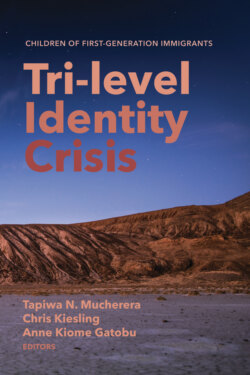Tri-level Identity Crisis

Реклама. ООО «ЛитРес», ИНН: 7719571260.
Оглавление
Группа авторов. Tri-level Identity Crisis
Tri-level Identity Crisis
Table of Contents
Introduction
Experiences of Immigrant Families in the West, with Special Reference to the USA
Children of African Immigrants
Children of Asian Immigrants
Children of Hispanic/Latin American Immigrants104
Child-Rearing Challenges for Undocumented Mexican Parents in Detroit
Caribbean Immigrants
“It Takes A Village” (ITAV) Camps
Immigrant Family Palavers or Indabas in Diaspora
Concluding Observations
Bibliography
Contributors
About the Editors
Отрывок из книги
Children of First-Generation Immigrants
edited by Tapiwa N. Mucherera, Chris Kiesling, and Anne Kiome Gatobu
.....
In the resistance stage the minority realizes he has been sold a “bill of goods” and that what s/he has been taught about minorities in general (he or she included) is not true especially as it pertains to the stereotypes. The focus and energy at this stage is more on the dismantling of the unjust system rather than individual prejudices. The person in this stage realizes that there is power in numbers and so joins other minorities of like minds who are willing to work against injustice and inequality in any form. A reference group that validates a sense of self and provides a place of belonging may become increasingly critical during the adolescent and young adult years. Some individuals in the resistance stage may express anger, sourced in part in the sense of having sold out especially in the conformity stage. How could they have been so blind to buy into or want to join such a system that is so oppressive to one? The anger is both at the self and those who have created such a system. Individuals in this stage rely on their minority group for support yet the energy that drives them in that group is based on anger, even though it is anger at the system. As much as the anger is against an unjust and unequal system, this can be very draining for someone to fight a system that has been in place for over 400 years.
The next question then is; for these individuals to survive in such a system, how can they spend energy fighting to transform the system and yet be able to make an everyday living? In addition, some individuals also find themselves in situations where they feel they can work in changing the system yet have friends who are White, without experiencing any guilt feelings about those relationships. However, to please one’s own group, and having a relationship with Whites may appear as “selling out.” In other words, the minority group starts questioning how someone who is committed to change is able to “sleep with the enemy,” so to speak. This is the introspection stage, of which Sue and Sue say:
.....